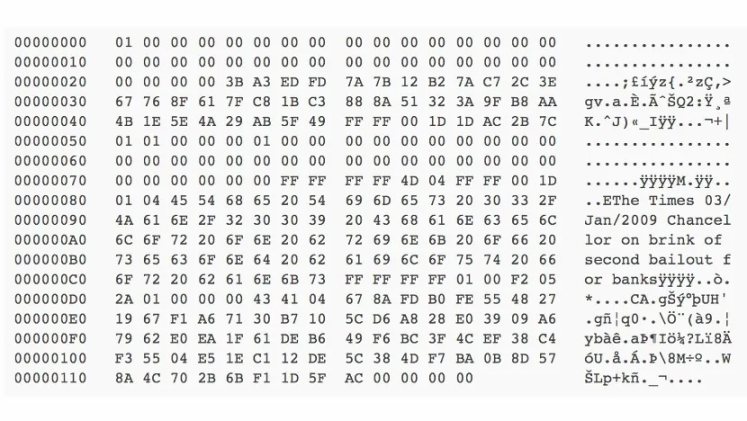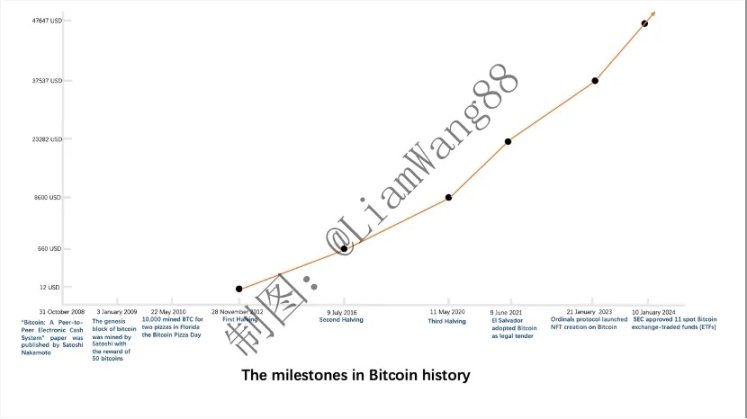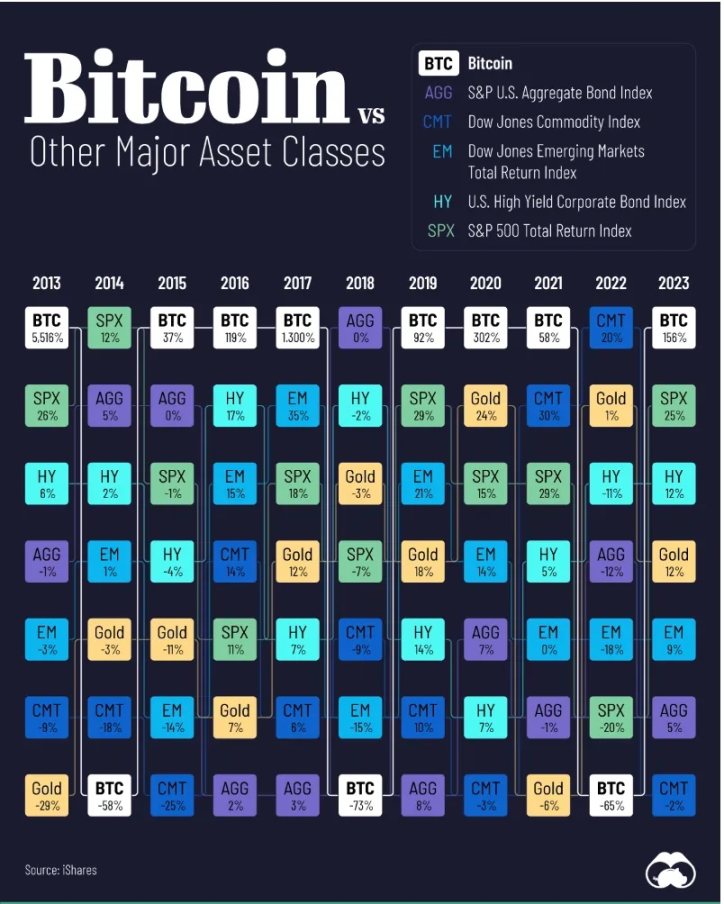Just a few days ago, the price of Bitcoin broke through $70,000, reaching a historic high. Since the release of the Bitcoin white paper by Satoshi Nakamoto in 2008, Bitcoin has been in development for 16 years. In these 16 years, Bitcoin has gone from being disbelieved to gradually being accepted by the public, from being considered worthless to reaching historic highs, which is a typical reflection of the tortuous development path of a new thing.
Undoubtedly, the rise in the price of Bitcoin has brought huge investment/speculation opportunities. Whether you are a long-term believer, a speculator, or an onlooker, it is inevitable to be shrouded in a huge FOMO sentiment, and everyone is enthusiastic about discussing the next high point of Bitcoin: $80,000, $100,000, $150,000, or even $200,000… Although the answers given are not exactly the same, the expectation of continued rise is surprisingly consistent.
In my opinion, the soaring sentiment helps Bitcoin to form a broader consensus foundation. However, the more in this atmosphere, the more it is necessary to detach from it, and it is necessary to look back at the birth and development of Bitcoin.
Brief History of Bitcoin Development: Milestone Moments
On October 31, 2008, a person named Satoshi Nakamoto published a paper titled "Bitcoin: A Peer-to-Peer Electronic Cash System." In this paper, Nakamoto detailed the feasibility of an electronic currency based on timestamps and proof of work.
Of course, many people will ask, why did Nakamoto publish such a paper? To answer this question, it is necessary to retrace what happened in the world in 2008.
On September 15, 2008, the bankruptcy of the large financial enterprise Lehman Brothers triggered a global financial crisis.
To cope with the crisis, the U.S. government launched a large-scale rescue operation for the domestic financial system, and the Federal Reserve started the printing press, adopting a quantitative easing policy that seriously harmed the stability of the global financial system. In that year, whether in New York, London, Tokyo, or Hong Kong, every financial practitioner felt precarious, worried about losing their job tomorrow; influential global media such as The Wall Street Journal, Bloomberg, The New York Times, and the Financial Times almost discussed the issue of what to do every day; every major event globally also discussed only one theme, which is how to rescue the market. In short, in that year, the global finance was in a state of lament, and everyone was shrouded in the shadow of economic recession.
The systemic collapse of the financial intermediation system and the self-defeating motives, coupled with the inflation and exchange rate fluctuations caused by the excessive issuance of sovereign currency, as well as the slow global rescue actions, all reflect the inherent fragility and defects of the traditional financial and global monetary system. It is in this background of the times that Bitcoin came into being.
On January 3, 2009, with the official launch of the Bitcoin system, Nakamoto mined the genesis block of Bitcoin (block number 0), and the Bitcoin network was officially born, and he himself received a reward of 50 bitcoins. Interestingly, a message was written in this block: "The Times 03/Jan/2009 Chancellor on brink of second bailout for banks."

https://en.bitcoin.it/wiki/Genesis_block
On May 22, 2010, a programmer named Laszlo Hanyecz, who lived in Florida, had the idea to try to use his bitcoins to buy something in the real world. In the end, he exchanged 10,000 bitcoins for two pizzas from a local pizzeria in Florida. This was the first time Bitcoin had exchange value, and May 22 is therefore known as "Bitcoin Pizza Day" among crypto enthusiasts.
On November 28, 2012, Bitcoin experienced its first halving in history. On that day, the price of Bitcoin was about $12 per coin, and six months later, on May 28, 2013, the price of Bitcoin rose to $130 per coin.
On July 9, 2016, Bitcoin began its second halving in history. On that day, the price of Bitcoin was about $660 per coin, and on January 9, 2017, the price of Bitcoin reached $900 per coin.
On May 11, 2020, Bitcoin experienced its third halving in history. On that day, the price of Bitcoin was around $8,600 per coin, and six months later, on November 11, 2020, the price of Bitcoin rose to $15,700 per coin.
The magic of Bitcoin has not ended. On June 9, 2021, the Salvadoran Congress passed a bill approving Bitcoin as the country's legal tender. This was the first time in history that a sovereign country officially adopted Bitcoin.
On January 21, 2023, Bitcoin developer Casey Rodarmor launched the Ordinals protocol, and a large number of inscriptions emerged, marking a historic moment in the creation of Bitcoin's ecosystem.
On January 10, 2024, the U.S. Securities and Exchange Commission (SEC) approved 11 Bitcoin spot ETFs, meaning that retail and institutional investors in the financial market can purchase Bitcoin to enrich their diversified investment portfolios, marking a milestone event in Bitcoin's history.

Looking at the development process of Bitcoin, if a new thing wants to become a particularly worthwhile investment asset, it is inevitable to continuously establish and solidify consensus, but more importantly, it must integrate multiple accidental and inevitable factors "perfectly":
① A special background of the times or an opportunity for systemic changes in human society;
② Demonstrating scarcity, the 21 million bitcoins determine that its supply is not unlimited;
③ Possessing innovative but mysterious attributes, no one knows who Satoshi Nakamoto really is;
④ Uniqueness, no one will deny that Bitcoin is the first product to demonstrate the spirit of decentralization of blockchain.
The Value of Bitcoin: Not Just Digital Gold
It is the "perfect" integration of these multiple accidental and inevitable factors that has created the distinctiveness of Bitcoin and given it a unique value.
For the value of Bitcoin, the most widely accepted consensus at present is to regard it as "digital gold," which means that Bitcoin, like gold, is a very good hedge asset against inflation.
This analogy seems reasonable, after all, the two have many similarities in characteristics. The most obvious are two points: ① the supply of both is limited; ② both can serve as alternatives to fiat currency.
Following this logic, let's take a look at the difference in market value between the two. According to data from companiesmarketcap, as of March 12, 2024, the market value of gold is $14 trillion, and the market value of Bitcoin is approximately $1.4 trillion.[1] From this perspective, Bitcoin still has at least ten times the growth potential. This logic is seen by many as a strong argument supporting the continued rise in the price of Bitcoin.
If we look at the long-term cycle, taking the ten years from 2013 to 2023 as an example, as shown in the chart below, except for 2014, 2018, and 2022, the overall return on investment of Bitcoin far outperformed assets such as gold and the S&P 500 index. This once again demonstrates the superiority of Bitcoin in investment appreciation and in combating inflation.

https://www.visualcapitalist.com/bitcoin-returns-vs-major-asset-classes/
The role of "digital gold" with a low market value has brought Bitcoin a very considerable growth space. But in my opinion, it is far from enough to simply understand Bitcoin from the perspective of "digital gold." In other words, I believe that Bitcoin is far more than just "digital gold"; its imagination is higher than gold. There are two main points:
1. Gold is currency, but Bitcoin is currency + technological ecosystem. Since the appearance of currency in human society, it has mainly carried three functions: ① value storage; ② value measurement; ③ medium of exchange. From the perspective of currency, there is no doubt that both Bitcoin and gold have these functions. However, the advantage that Bitcoin has over gold is that it not only has the attributes of currency, but it is also a new technological innovation. This is something that gold cannot compare to.
Because of its technological attributes, the blockchain represented by Bitcoin has more flexible scalability and is easier to derive and develop a technological ecosystem. Today, with the emergence of inscriptions and other new things, the Bitcoin ecosystem is rapidly rising. Although it is uncertain what the future Bitcoin ecosystem will look like, it is certain that the technological attributes of Bitcoin will bring greater imaginative space combined with its currency attributes.
2. Gold is prepared for human society, while Bitcoin is prepared for the new intelligent human society. The so-called human society includes different social forms such as slave society, feudal society, and capitalist society. In these forms, gold has been with us for thousands of years.
In my opinion, the understanding of the new intelligent human society is a completely different social form created by future humans through stronger intelligence:
① Interstellar society: We are no longer just earthlings, but will become spacefarers. Musk's plan to immigrate to Mars has shown that some adventurers in the human species are advancing in this direction.
② AI-human society: Yes, I'm not talking about humans + AI, but AI humans. This means that humans will not only coexist with the AI they create, but humans themselves will also have some AI capabilities, implanting chips into the human brain, and anything is possible, right? Similarly, OpenAI has already shown us the powerful capabilities of AI, and we have also heard too many new terms about virtual society: metaverse, digital humans, virtual avatars… In the process of transitioning from the real society to the virtual society, humans have never stopped exploring.
Whether it is an interstellar society or an AI-human society, a social and economic system will need to be established, and there will need to be a currency to serve as a medium of value storage, value measurement, and value exchange. At least for now, there is no other item more suitable than Bitcoin. Of course, as many people are concerned, with the increasing maturity of quantum computing, perhaps one day the Bitcoin code will be cracked, and it will no longer have the attribute of scarcity. There are also those who question whether if humans really do immigrate to Mars one day, they will find something similar to gold there, and Bitcoin will not be the ultimate option.
No one can predict what the future will be like. Placed in the long river of history, every new thing is actually a social experiment of major changes in human society. But looking at the future from the present, Bitcoin, which has been developing for 16 years, is far from over.
Opportunities for Bitcoin: Standing at a New Starting Point
Since the birth of the Bitcoin genesis block in 2009, early participants in Bitcoin have reaped substantial returns. When you prove that you have made money on Bitcoin, it either proves that your understanding is deep enough, or that your luck is good enough. With the approval of the Bitcoin spot ETF in January 2024, I believe that Bitcoin has stood at a new starting point. At this starting point, my judgment is:
① The positioning of Bitcoin as a hedge asset is becoming stronger, and the overall chips will be more and more concentrated in the hands of institutions and large holders, stimulating the investment demand of retail investors for Bitcoin but requiring new supply.
② The attributes of the Bitcoin technological ecosystem are just beginning to show. Whether you are a long-term believer or an investor/speculator, you will consciously or unconsciously create and explore new alpha opportunities. The emergence of inscriptions can be said to be an attempt. The reason I use the word "attempt" is because I don't know if inscriptions are the correct answer, or if there are other possibilities. But if one day when you make money on Bitcoin, it's still the same old saying, it either proves that your understanding is deep enough, or that your luck is good enough.
免责声明:本文章仅代表作者个人观点,不代表本平台的立场和观点。本文章仅供信息分享,不构成对任何人的任何投资建议。用户与作者之间的任何争议,与本平台无关。如网页中刊载的文章或图片涉及侵权,请提供相关的权利证明和身份证明发送邮件到support@aicoin.com,本平台相关工作人员将会进行核查。




